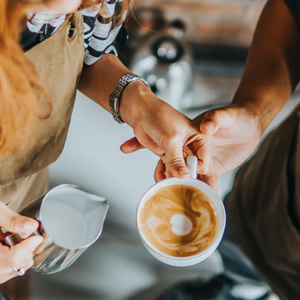What does barista training involve?
Barista training includes much more than simply learning how to make a well brewed cup of coffee. Baristas mustpossess a vast amount of knowledge to serve coffee to a professional standard.
Having baristas gain experience through trial and error is fine. As a business owner, however, this can be costly for both money and custom. Learning the basics of barista training might also appeal to those who love coffee and want to get better at making it at home.Let’sgo over what barista training is, what skills can be learned, and if a course might be right for you.
What does a barista do?
A barista is an all-round employee whose primary role is to prepare and serve hot and cold drinks. Their other responsibilities include taking orders, processing payments, catering to customer preferences, and various cleaning duties.Baristas in certain venues will also be required to prepare speciality beverages, as well as teas and food items.
Baristas perform a vital function, as the main customer interaction point in coffee shops and cafes. Businesses therefore rely on baristas to establish a good rapport with customers,resulting in repeat sales.
What areas are covered by barista courses?
All barista courses will give individuals the skills they need to function in a workplace environment. As a result, barista training covers the areas needed to create high quality coffee efficiently.People don’t want to be waiting for their morning coffee no matter how good it is. Training allows baristas to develop their skills to the point where they can make great coffee while still providinga high level of customer service.Depending on the nature of the course, training might also cover more advanced areas to do with presentation.
Milk steaming
Heating and frothing milk is an essential skill for making lattes, flat whites, and cappuccinos. Most coffee courses will therefore cover use of the steam arm–purging the wand, best practice for foaming,and any associated health and safety risks of steam.Different milk steaming techniques will be used in the making of different drinks.
Espresso extraction
Espresso, simply a combination of finely ground coffee and water, forms the basis for many coffee-based drinks. Producing a consistent espresso every time take practice and precision. Most basic barista training courses will go through step by step how to achieve this. Factors include:
- Measuring techniques
- The grind
- Dosage
- Distribution
- Tamping the grounds
- Extraction
How to set up a coffee machine
Most baristas will need to make sure their station is ready in the morning. An essential part of this is setting up the coffee machine. The process will vary slightly depending on the type of machine being used. You should therefore investigate which type of machine you’ll be trained on before taking a coffee course.
Barista tools
Coffee can’t be made without the right tools. All barista training courses will cover what the basic barista tools are and how to use them. Pumphrey’s has a big range of coffee making tools and accessories to make brewing at home easy.
Cleaning practices
Both the cleaning of the coffee machine and tools is required in the daily routine of a barista. Equipment like the milk jug,portafilter and blanking baskethave to be cleaned regularly. This is as much for health and safety as it is for quality control.For instance, coffee bean oils can build up and become rancidif left for too long. As such, the different approaches to cleaning will be covered in depth.
Accessory skills
More advanced training will teach skills like latte art and using stencils. However, these course will also go into more detail in areas like espresso extraction, milk frothing, and use of barista tools. Some examples of the advanced skills you’ll learn are temperature brewing, weighing espressos, the importance of dose settings, and the inner workings of relevant equipment.
What skills do you gain from barista training?
- Customer service
- Expansive coffee knowledge
- Health and safety best practice for food preparation
- Confidence
- Quality coffee making
- Organisation
- Multitasking
The business benefits of trained baristas
Baristas are the face of any café, coffee shop or small daytime eatery. They’re often the main point of contact between customers and the business. As such, the quality of service visitors receive from a barista goes a long way in forming lasting customer relationships. People will often choose a favourite spot for coffee or tea and make that their go to. This is a great opportunity for café owners to secure a reliable stream of income. Barista training directly contributes towards this byinstilling social skills and emphasising the importance of customer service.
The other benefit is to guarantee quality. When someone chooses to get coffee from a shop, it usually reflects a desire for a high-quality beverage. Trained baristas can meet and often exceed customer expectations. Drinking hot and cold drinks is a social activity. Therefore, businesses that are known to be high quality can often secure more sales from groups.
Professional Barista Training UK
Whether you’re thinking about a career as a barista or you simply want to make great coffee, barista training is a worthwhile pursuit.At Pumphrey’s Coffee, we offer expert barista training courses with certificates given by the Beverage Standard Association (BSA).You’ll be following in the footsteps of our highly knowledgeable and skilled baristas.
Get in touch with us today.

 Pound Sterling
Pound Sterling
